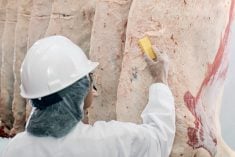As readers are no doubt aware, on February 3, 2025, the Canadian and U.S. governments announced a 30-day pause on the imposition of 25 per cent tariffs on imported goods from each other. A week later, the U.S. imposed 25 per cent tariffs on all steel and aluminum imports, including from Canada, effective March 12. The only certainty at this point is that uncertainty will continue over the next several weeks as Canada and other affected countries respond to the threatened trade disruptions.
The proposed U.S. tariffs present multiple challenges for Canada’s beef industry. Canada exports approximately 50 per cent of its beef and cattle production with about 75 per cent of those exports going to the U.S. As negotiations to resolve the issues continued in February, Canada Beef developed two plans — an adjusted reactive plan (reallocation of our actual budget) and a proposed comprehensive strategic marketing response to address the widespread implications to the Canadian beef industry should the U.S. impose tariffs on Canadian beef and cattle.
Working very closely with Canada’s ranchers and producers, packers, the Canadian Cattle Association (CCA) and the value chain, Canada Beef developed a proposed $3.5 million U.S. Trade Disruption Response Plan to help reduce the effect of tariffs and position the beef industry for long-term success. This plan, with the help of CCA, is being presented to Canada’s Minister of Agriculture and Agri-Food for consideration for additional federal government industry development funds.
Beef industry matching funding for the agreement would come from reallocations of existing Canada Beef budgets and emergency reserves. Implementation and scale of the U.S. Tariff Response Plan will be wholly dependent upon receiving emergency government industry development funding. Unfortunately, Canadian beef producer organizations do not have the financial resources necessary to fund the needed response initiatives on their own.
Read Also

Building demand together: The impact of Canada’s beef import levy
The beef import levy has become a central tool for ensuring balance in Canada’s beef industry
The U.S. Tariff Response Plan aims to ensure Canadian beef remains a preferred protein via initiatives to enhance marketing, expand international market reach, strengthen industry collaboration and reinforce domestic demand.
The response plan has four pillars:
- Enhanced domestic market development and promotion.
- Enhanced international market development and diversification.
- U.S. market development and promotion.
- Strengthened industry and government collaboration.
The plan will deploy multiple tactics to achieve high-level objectives under each pillar.
Domestic market development and promotion: Strengthen domestic demand using aggressive marketing tactics to build and sustain enhanced consumer loyalty for Canadian beef.
International market development and diversification: While the U.S. remains a critical export destination, Canada Beef is accelerating efforts to diversify its global market presence. Canada Beef will work with the CCA and Canadian Meat Council to lessen the trade tariff disadvantage versus the U.S. in Korea (eight per cent tariff disadvantage) and encourage the negotiation of new market access for Canadian beef to countries in Asia like Malaysia.
U.S. marketing and consumer outreach: Undertake targeted market development initiatives with key partners in several states and work with trade commissioner offices to limit negative effects on demand and consumer confidence in Canadian beef in the U.S. market.
Strengthening industry and government collaboration: Actively engage and collaborate with industry partners to push for solutions and relief measures.
If U.S. tariffs are implemented, the U.S. Tariff Response Plan will be vital to support the Canadian beef industry during the significant market disruptions that will follow.
February has been a high-profile month for Canadian beef promotions. The Burger It Forward campaign ran February 1-28, with a record 250-plus participating restaurants. This giveback initiative remains a great way to get Canadians on board with beef to support a good cause. The goal of the 2025 campaign was to best the results of the 2024 campaign. We look forward to sharing final results as soon as they become available.
Canada Beef encouraged Canadians to add an extra helping of national pride to their celebrations for Canada’s Agriculture Day on February 11.
The annual Canada Ag Day celebrates the nation’s hardworking agricultural producers who grow and raise the nutritious high-quality foods that help families thrive and the essential contributions of agriculture to Canada’s economic prosperity. In celebration of both farm gate and culinary food producers, Canada Beef served up the award-winning short documentary film, A Nation’s Table, which showcases the contribution and legacy of the late Anita Stewart.
In 2003, when Canada’s beef industry was hardest hit by BSE, the renowned cookbook author and foodie known as the patron saint of Canadian cuisine stepped forward and created the world’s longest barbecue event to support beef farmers and ranchers. Stewart encouraged her network of culinary, foodie and home chefs to barbecue in their backyards on the August long weekend and then share their experiences with her. This grassroots event was a huge success and evolved into Food Day Canada, an official day held each August to recognize, celebrate and show gratitude for Canadian foods and culinary traditions.
In celebration of Canada’s Ag Day, Canada Beef invited Canadians to watch the documentary and get stoked about Canadian cuisine, then continue the conversation about Canadian food and agriculture online. We shared tips for buying Canadian when food shopping, such as checking for labels that indicate Canadian origin. Canada Beef’s “Pick the Beef with the Leaf” program tells shoppers what to look for to ensure they are buying Canadian beef.
A Nation’s Table — produced by Ward1 Studio in association with Canada Beef, the Arrell Food Institute at the University of Guelph and Food Day Canada — serves as a poignant reminder of Canada’s proud legacy as a world-class producer of high-quality nutritious food for the world.
– Eric Bienvenue is a strategic leader with more than 25 years of senior leadership experience in Canada’s animal protein sectors. A native of Saint-Valérien, Que., Bienvenue is based out of Canada Beef’s Calgary headquarters and resides in Airdrie, Alta. Gina Teel is the director of stakeholder communications for Canada Beef, where she provides timely and effective communication of all Canada Beef initiatives and outcomes to funding partners and industry stakeholders, media, consumers, and other external audiences.
















